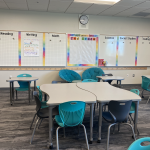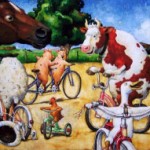It's our annual Exhibition Week at City High School, during which every single student must successfully present on their learning in order to advance to the next grade level. The presentations are called "gateways" and for most students, the audiences are packed with peers, teachers, and family members.
Lena, for part of her sophomore gateway, was required to demonstrate mastery in a skill she has developed this year by teaching us how to do something. She decided to teach us how to draw an eye. In a carefully crafted, step-by-step lesson plan, complete with stop-gap animation and art supplies, Lena taught us all how to draw an eye, from the outline to the iris to the lashes. I am not an artist, but I have made my share of attempts to draw eyes, usually with pretty bad results. Yesterday, after Lena's lesson, I drew my best eye yet. And so did everyone in the room. Students and teachers were showing eachother their drawings, proud of and surprised by what they had rendered.
At the end of the lesson, Lena threw up an arm and said "Ta DAAAAA!" She knew she had nailed that part of the gateway before even receiving any feedback from her evaluators.
In my current graduate class on leadership theory, we are studying motivation and how it relates to feedback. The professor suggested last week that the most powerful and motivating feedback comes from the work itself, not from external sources. That when circumstances are cultivated in which people do their best work, they know they have done so, they can tell you why, and they don't need a rubric to confirm it.
Most of the ensuing questions sounded like this: "How are we supposed to evaluate teachers, then? Do they know what "best work" looks like?" or "How do we teach people how to recognize when they have done their best work?"
I'd like to argue that we all have an intuitive sense of when we have done our best work. My two-year-old arranges her blocks just so and says "I DID IT!" She doesn't make that claim until she gets it just right. Perhaps it's not our job as educators to teach our students what their best work feels like or looks like, but rather it's to help them remember that they know when they have done their best work. What our students need help in is how to reflect on and talk about it.
The same holds true for teachers. Any teacher knows when he or she has either hit a home run or blown it in the classroom. They don't need multi-page rubrics to confirm when these things happen, but rather tools and activities that help them reflect upon and discuss with colleagues and supervisors what makes for the home run.
Sarah, a junior who presented her gateway yesterday, was charged with the task of defining "lifelong learning". At one point during her presentation, she said enthusistically "If you put in the effort and time, and you think back on what you have done and you KNOW it was good, then it won't be about a grade. That's what ifelong learners do."
Sarah hit a home run. It was one of the best gateways I had seen in the ten years years we have been doing them. And the most exciting part of watching a job so well-done, is that Sarah knew she had done a great job. Her evaluators gave her near perfect scores, but she didn't need to see the rubrics to know that she had done her very best work.
Schools should be places where everyone gets to say "Ta DAAAA" often throughout the school year. And in order to move in this direction, we need to create cultures in which everyone, students, teachers, and administrators, are given time to remember back to when they regularly would shout out "I DID it!"









Comments 1
Eve — thank you for bringing to light what I think is one of the most important things for teachers to remember: our place in assessment. You point out two amazing student examples of how traditional assessment misses the most important moments of teaching. As we continually align ourselves in the Common Core State Standards we must remember that these standards are guidelines for teaching (not assessment). We must remember to leave as much control as possible in the hands of students to ensure that they show us “true” learning.
Thanks for sharing this.